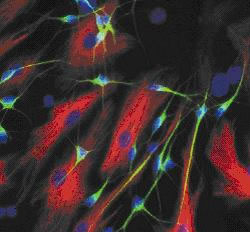Scientists at Kyoto University are developing an exciting new treatment which might one day provide a treatment for sufferers of Parkinson's disease.
Parkinson's is a degenerative disease in which the sufferer finds it increasingly difficult to carry out smooth, controlled movements. Famous sufferers include Mohammad Ali and Michael J. Fox.
The problem in Parkinson's disease is that the sufferer slowly loses a type of brain cell which produces the chemical dopamine - so-called dopaminergic neurons. It is these neurons which are implicated in executing controlled movement.
The Japanese group, led by Jun Takahashi, have been using stem cells to try to overcome this problem, as explained in a paper published in the journal Stem Cell Reports this week.
The study used a group of monkeys from each of which they took a sample of cells, either from their mouths or from their blood. These cells were then grown in the lab, where they were induced to return to the stem cell state - the state in which a cell is undecided and can divide to form any other type of cell in the body. The cells were then persuaded to divided to become dopaminergic neurons, such as those lost in Parkinson's Disease.
These dopaminergic neurons were then grafted back into either the brain of the monkey from which they were derived or into the brain of a completely different monkey. The monkeys were then left for 3.5 to 4 months.
After this time, the researchers noted that both types of cell graft had survived in the brain, although those cells  which were derived from same monkey did slightly better than those from a different monkey. However, the survival rates of both types of cell graft were extremely significant.
which were derived from same monkey did slightly better than those from a different monkey. However, the survival rates of both types of cell graft were extremely significant.
This provides us with an interesting new avenue for Parkinson's treatment. Previously, it was thought that this kind of graft might only be really effective if the cells were derived from the same animal into which they were grafted. However, this study suggests that it might be possible to have a more generic treatment for Parkinson's, where the same type of stem cell-derived dopaminergic neurons could be implanted in to the brains of all Parkinson's patients. This has a significantly lower cost than a personalised graft.
There are clearly still many other things that need to be tested - we do not currently know if the grafted cells are able to restore the function of the missing dopaminergic neurons. However, this is still very interesting as a potential future treatment for Parkinson's disease.
- Previous Jetlag-resistant mice
- Next Inhalable viral vaccines










Comments
Add a comment